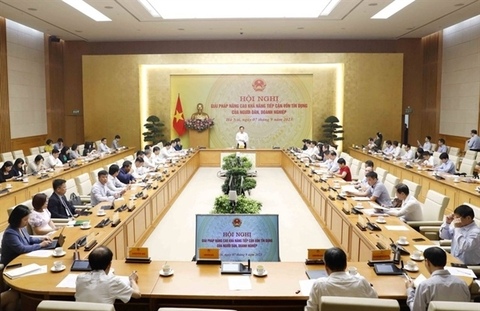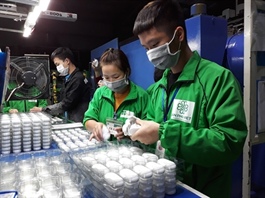Gov’t seeks measures to increase capital absorption of the economy
Gov’t seeks measures to increase capital absorption of the economy
Deputy Prime Minister Lê Minh Khái on September 7 led a discussion focusing on strategies to enhance enterprises' access to bank loans and bolster the economy's capacity to utilise capital, especially since credit growth this year has been lacklustre.

View of the meeting. The central bank has taken many measures to increase the credit growth, but the indicator by August 29 this year increased by only 5.33 per cent compared to the end of 2022, against 9.87 per cent in the same period in 2022. Photo baochinhphu.vn |
Deputy PM Khái highlighted that despite many directives from the Government and Prime Minister Phạm Minh Chính concerning credit and interest rates, which have aided in the gradual advancement of the nation's economy amidst global challenges, the results haven't met expectations.
As such, a comprehensive evaluation is essential to devise more holistic, apt, and effective methods that can swiftly alleviate challenges, optimally assist businesses and the public, and enhance the economy's capital absorption capacity. These strategies should encompass aspects like interest rates; stipulations and prerequisites for credit access; enactment of particular support initiatives; and backing from different ministries, sectors, and regions, the Deputy PM stressed.
At this meeting, Đào Minh Tú, the Standing Deputy Governor of the State Bank of Vietnam, voiced that the management of monetary policy by the SBV is facing unprecedented challenges. The entire banking sector is grappling with the issue of surplus funds. This scenario parallels companies struggling with excessive stock, as commercial banks are now contending with an overabundance of money.
Despite the State Bank of Vietnam (SBV) and the wider banking sector's continuous efforts to foster relationships between banks and nationwide firms, streamline administrative processes, restructure debt repayment terms, offer interest rate support, and expand credit access to real estate and primary agricultural products, injecting credit into the economy proved challenging. Firms were unable to assimilate capital and were reluctant to borrow, noted Tú.
Data from the SBV revealed that by 29 August this year, bank loans had risen to approximately VNĐ12.56 quadrillion, marking a 5.33 per cent increase from the close of 2022. This growth is substantially lower than the 9.87 per cent rise observed during the corresponding period in 2022.
Over the past three years, there has been an average annual increment of about VNĐ1 quadrillion in bank loans.
Tú pinpointed the reasons for this subdued credit growth, pointing to diminishing investments, production, business, and consumption. Moreover, certain customer segments, particularly small- and medium-sized enterprises, expressed a need for bank loans but failed to fulfil the requisite conditions.
Furthermore, the execution of several credit schemes with interest rate assistance has met with obstacles and impediments.
To enhance firms' loan accessibility and bolster the economy's capacity to secure capital, the SBV has put forward four primary solution clusters: invigorating investment, consumption, and other economic growth catalysts; cultivating diverse market forms such as corporate bonds, real estate, and securities; augmenting the proficiency and capital assimilation capability of businesses; and devising strategies concerning currency, credit, and interest rates.























